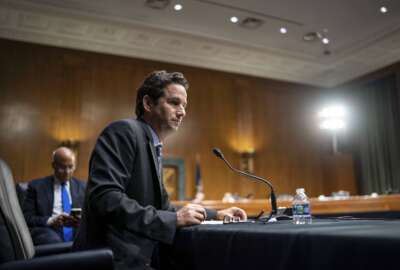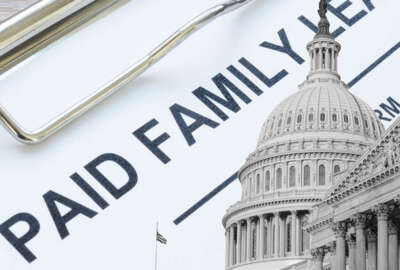
Union leaders, lawmakers call for expanded pay, benefits for federal workforce
The American Federation of Government Employees heightened calls to Congress to implement an 8.7% pay raise for 2024 and remove Social Security’s WEP and GPO,...
Federal employees got a clearer vision of the legislative priorities for union leaders, and some lawmakers, over the next couple of years.
Pushing to give the federal workforce an 8.7% average pay raise in 2024, for one, is top of mind for the American Federation of Government Employees, according to union leaders at the annual AFGE legislative conference on Feb. 13.
The 8.7% raise is included in the latest iteration of the FAIR Act, which Rep. Gerry Connolly (D-Va.) and Sen. Brian Schatz (D-Hawaii) reintroduced last month. The legislation would break down the 8.7% raise between a 4.7% across-the-board pay raise and a 4% average locality pay bump.
“This year, we decided if Social Security could get an 8.7% increase, so can federal employees and federal retirees,” Connolly said at the conference, which laid out much of the groundwork of the federal union’s goals for this Congress.
Although Connolly has remained a proponent of the FAIR Act for several years, Congress has never passed any version of the bill. Typically, the enacted pay raise for federal employees is lower than what’s included in the annual legislation.
“We really believe that federal employees deserve at a minimum an 8.7% pay increase, but that’s still not going to close the gap,” AFGE National President Everett Kelley said during a press conference.
Notably, wages for federal employees fall 24.09% behind their private sector counterparts, on average, according to the most recent calculation from the Federal Salary Council. Kelley added that AFGE will continue to push to get the legislation enacted for next year, and the union plans to hold a rally on Feb. 14 in support of the FAIR Act.
Along with the FAIR Act, the union also reinvigorated its calls for the passage of the Social Security Fairness Act, a bill that would repeal the Windfall Elimination Provision (WEP) and the Government Pension Offset (GPO). The two decades-old provisions reduce, and in some cases eliminate, Social Security benefits for some feds and their spouses, widows and widowers.
Rep. Abigail Spanberger (D-Va.), in partnership with Rep. Garret Graves (R-La.), reintroduced the bipartisan legislation this Congress. Spanberger added that trying to get the Social Security Fairness Act passed this year is one of her “very top priorities.”
“We did not yet get it across the finish line,” she said at the conference. “These two provisions unfairly reduce the Social Security benefits of federal retirees and other public sector employees. And they have done so for nearly four decades. We are continuing to do the work to get rid of these provisions.”
The bill gained significant support last Congress, with more than 300 co-sponsors, but ultimately the legislation did not pass. The Social Security Fairness Act has been introduced in some form for decades. The latest version of the bill, introduced last month, has already gained nearly 150 bipartisan co-sponsors.
“Congress should be focused on ways to improve federal employees’ pay and benefits, bolstering recruitment and retention efforts, so that our federal workforce can compete with the private sector and advance your mission and service to our communities,” Spanberger said.
Another priority was the Comprehensive Paid Leave for Federal Employees Act, which would give federal employees 12 weeks of paid leave for family and medical issues. The leave would be separate from personal and sick leave, and would essentially replace the 12 weeks of unpaid leave available through the Family and Medical Leave Act (FMLA).
“We are one of the very few countries in the civilized world that doesn’t guarantee full paid leave for their workforce, and especially for our government workforce,” Rep. Don Beyer (D-Va.), who reintroduced the bill, said at the conference. “I think this is something that we can make bipartisan enough that we can actually do in these next two years — pass it in the Senate and put it on President Joe Biden’s desk.”
Additionally, lawmakers renewed their push to advance the Preventing a Patronage System Act, a bill that the House passed last year, but that ultimately did not clear Congress. The legislation would prevent any current or future presidential administration from enacting a Schedule F-type policy. The Schedule F executive order from the Trump administration, which Biden revoked in his first week in office, would have made about 50,000 federal employees in policy-making positions at-will workers.
“It’s clearly designed to reintroduce the spoil systems to civil service,” Connolly said. “We’ve been fighting that since the adoption of the Pendleton Act in the 1880s … We haven’t won that fight. I got that bill passed in the House. But it didn’t survive the conference with the Senate. So we’re going to try again. And we won’t cease until we win, however long that takes.”
Notably, a recent development in Congress regarding the federal government’s telework policy was a point of contention for AFGE leadership and several Democrat lawmakers.
Members of Congress and union leaders at the conference expressed their disapproval of the SHOW UP Act, a Republican-led bill that would return the federal workforce to pre-pandemic work locations — in effect largely reducing the amount of telework options available to federal employees.
House Oversight and Accountability Committee Chairman James Comer (R-Ky.), who introduced the bill, has said that returning feds to in-person office spaces would improve productivity and reduce agencies’ pandemic-induced backlogs and delays.
But according to critics of the bill, the SHOW UP Act “would essentially take a sledgehammer to telework and remote work arrangements that have developed so systematically, methodically and carefully over the last decade in different federal agency workplaces,” Rep. Jamie Raskin (D-Md.) said in a video message at the conference.
AFGE noted, though, that the entirety of the SHOW UP Act wasn’t completely supported along party lines. One Republican lawmaker, Rep. Brian Fitzpatrick (R-Pa.) introduced an amendment that would have struck one provision of the legislation, and would have kept in place telework agreements already in place under collective bargaining agreements.
But the legislation moved to a floor vote without the consideration or adoption of any amendments. The bill cleared the House mostly along party lines in a vote of 221-206 on Feb. 1.
“It’s my opinion that federal agencies should listen more attentively to the workforce,” Kelley said. “We’ve got to make sure that we are innovative. In order for us to compete, we’re going to have to be able to offer some forms of teleworking … [For] the employees, that’s what they’re seeking.”
With some agencies struggling to recruit and retain younger, early-career federal employees, he added that these types of advocacy efforts become all the more critical.
“We’re in a time now where we really need to refocus,” Kelley said. “If we’re going to be able to maintain federal employees, we’ve got to make sure that we are offering good benefits [and] we’ve got to make sure that we are innovative.”
Copyright © 2025 Federal News Network. All rights reserved. This website is not intended for users located within the European Economic Area.
Drew Friedman is a workforce, pay and benefits reporter for Federal News Network.
Follow @dfriedmanWFED





